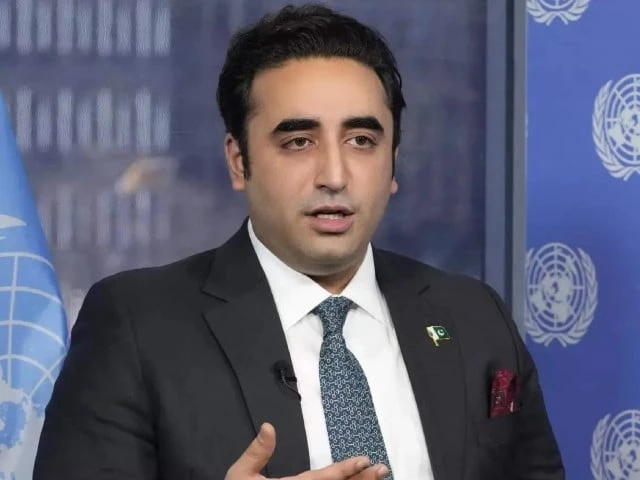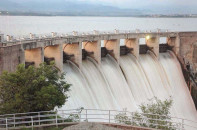PM assigns Bilawal to lead peace delegation highlighting Indian aggression abroad
Delegation will engage with global leaders to raise awareness about India’s actions, Pakistan’s concerns regarding IWT

Prime Minister Shehbaz Sharif has appointed Pakistan Peoples Party (PPP) Chairman Bilawal Bhutto Zardari to lead a high-level delegation tasked with presenting 'Pakistan’s case for peace' on recent Indian aggression to the international community.
Chairman PPP Bilawal Bhutto, who also served as foreign minister in the previous government, has accepted the Prime Minister’s offer to lead the delegation.
In a post on social media platform X, Bilawal Bhutto wrote, “I was contacted earlier today by Prime Minister Shehbaz Sharif, who requested that I lead a delegation to present Pakistan’s case for peace on the international stage. I am honoured to accept this responsibility and remain committed to serving Pakistan in these challenging times.”
According to Express News, the committee will engage with global leaders and institutions to raise awareness about India’s actions and Pakistan’s concerns regarding the Indus Waters Treaty.
The delegation, led by Bilawal Bhutto, will include Khurram Dastgir, Hina Rabbani Khar, and Jalil Abbas Jilani, who will travel to various countries to highlight Pakistan’s position on Indian hostilities.
Sources indicate that Bilawal is expected to begin a European tour soon, where he will meet with foreign dignitaries to brief them on India’s actions and Pakistan’s diplomatic perspective.
The government has also planned to send additional delegations to other countries as part of a broader diplomatic outreach.
Pakistan-India Ceasefire
The latest escalation between Pakistan and India began on April 22, when an attack in Pahalgam killed 26 people. India immediately blamed Pakistan for the incident. However, Pakistan categorically rejected the Indian blame.
Read More: Pakistan never requested ceasefire: DG ISPR
In response, India undertook a series of hostile actions the next day on April 23, including suspending the 65-year-old Indus Waters Treaty (IWT), cancelling visas for Pakistani citizens, closing the Wagah-Attari border crossing, ordering the shutdown of the Pakistan High Commission in New Delhi, and reducing diplomatic staff at each other's embassies.
Tensions further escalated in the early hours of May 7, when missile strikes hit six cities in Punjab and Azad Jammu and Kashmir (AJK), destroying a mosque and killing dozens of civilians, including women, children, and the elderly.
Read More: French intelligence official confirms downing of Rafale by Pakistan
In a swift military response, Pakistan’s armed forces shot down Indian warplanes, including three Rafale jets. The confrontation intensified again in the early hours of May 10, when India targeted several Pakistani airbases with missile strikes. In retaliation, Pakistan launched Operation Bunyanum Marsoos, damaging Indian military installations, including missile storage sites, airbases, and other strategic targets.
By Saturday evening, US President Donald Trump announced that a ceasefire had been reached following intense diplomatic efforts overnight. Minutes later, the agreement was confirmed separately by Pakistan’s Foreign Minister Ishaq Dar and the Indian foreign secretary.
What is the Indus Waters Treaty?
The origins of the IWT can be traced back to the Partition of British India in August 1947, when India and Pakistan became two independent nations. Both countries, now home to over 1.6 billion people, have historically relied heavily on the rivers flowing from the Himalayas for irrigation and agriculture.
The division of the Punjab province, which was extensively developed under British rule with an integrated irrigation system, created an immediate need for an agreement on the equitable sharing of the river waters between India and Pakistan. This was essential to prevent any future conflicts over this vital resource, particularly given that the new border separated the territories through which these rivers flowed.
Read More: Here's what India's suspension of Indus Waters Treaty means for Pakistan
After nine years of negotiations, facilitated by the World Bank, the IWT was signed in September 1960 by then-Indian PM Jawaharlal Nehru and former Pakistani president Ayub Khan. India was given control over the three eastern rivers—Ravi, Sutlej, and Beas—while Pakistan was assigned control over the three western rivers—Indus, Jhelum, and Chenab. As part of the treaty, India is required to allow the waters of the western rivers to flow into Pakistan, with only a few exceptions.
The treaty also allows India to develop hydroelectric projects on the western rivers, but these projects must adhere to strict conditions. They must be "run-of-the-river" projects, meaning that they cannot significantly alter the flow or storage of water, ensuring that Pakistan’s water rights as the downstream riparian country are not adversely affected.

























COMMENTS
Comments are moderated and generally will be posted if they are on-topic and not abusive.
For more information, please see our Comments FAQ